Prickly pear cactus flower opening
Note the ants on this Opuntia engelmannii flower opening in my neighborhood on April 28th.
* * * * * * * *
About 20 years ago I got to meet a distant relative of mine from another country who came to stay with us for several months. He enjoyed nature, so one morning we set out for an attractive place west of Austin. During the drive we talked about various things, and at one point he startled me by admitting that he would say something he knew to be false if it furthered a cause that he favored. And just the other day I came across something similar in Michael Shellenberger’s Apocalypse Never. He quoted a Sierra Club member saying “I think that playing dirty, if you have a noble end, is fine.”
I’m too wedded to the truth to lie or play dirty, but alas, those tactics have become all too common in the past several years and especially since 2020. Time after time I’ve encountered media “news” stories putting forth a claim that readily available evidence shows isn’t true. What usually happens in those cases is that if you bring the refuting evidence to the attention of the people making the false claim, they still continue making it, sometimes even more fiercely than before.
Another practice unethical people in the “news” media engage in is to quote something that a person said but to leave out words that cast the statement in a different light, often the opposite of what seems to be the case in the edited version. If you see an ellipsis (three dots indicating words have been omitted) in a quotation that seems damning, don’t draw any conclusions until you see what has been left out, along with the statements preceding and following the quoted words. In short, get the full context. It’s disheartening to see activists suppress evidence and quote people in purposely misleading ways, but that’s the sad world we’re living in.
© 2021 Steven Schwartzman

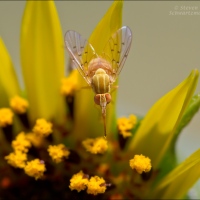
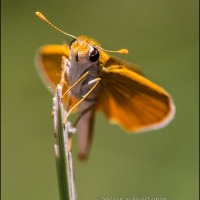

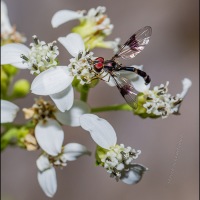
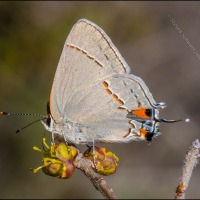
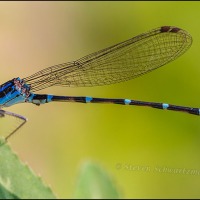

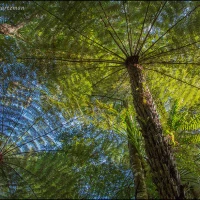

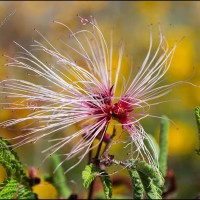
It looks like the ant in the lower left is carrying a pollen grain. I’ve been watching the group of O. engelmannii var. constructianii along Highway 146 providing even more flowers. Even in the midst of rebar and broken concrete, they shine. I’m eager to find some that are more accessible.
My parents used to impress on me that the end doesn’t always justify the means. Unfortunately, there are people who somehow missed learning — or rejected — that lesson.
shoreacres
May 7, 2021 at 6:54 AM
You’re funny with that variety name. As you know, prickly pears in my area are common and accessible—at least as accessible as prickly pears are ever going to be. There are many groups I can walk right up to, but if an interesting flower or tuna is in the center of a stand, there may be no safe way to get to it. Even with flowers or fruits at the edge, I have to be careful, as the ground often harbors fallen pads complete with glochids.
Yes, the ant in the lower left did appear to be carrying a pollen grain, and it made me wonder whether the ants eat the pollen themselves or feed it to their larvae or do something else with it.
Good for your parents for instilling morality in you.
Steve Schwartzman
May 7, 2021 at 7:16 AM
Beautiful flower photo, I love prickly pear cactus flowers. So delicate.
Yes it upsets me too. One such common lie is “the Amazon is the lungs the world.” It’s been known for decades that it’s not true as stated, but there are people who still repeat it. And on quoting, a while ago, a runner friend was interviewed by a local newspaper about her method of training, run-walk. In her 70s she completed a few marathons by running one minute and walking 30s intervals. The newspaper asked her several questions and the headline was “her name here defends that walking is healthier than running” throughout the text, they quoted her out of context to make a case. We were all very upset because she doesn’t think that, and she has never agreed to talk to a newspaper again.
Alessandra Chaves
May 7, 2021 at 7:42 AM
I decided to do a simple, straightforward portrait of a prickly pear cactus flower, which the surrounding darker area enhanced.
One of the points Michael Shellenberger makes in Apocalypse Never,” which I’m reading, is the same as the one you just made, namely that the Amazon rainforest is not the lungs of the world, however often the contrary claim is put forth.
Because your friend had that experience with a newspaper reporter misrepresenting something she said, we understand why she didn’t want to talk to any more reporters. Did she contact the newspaper and ask the editor to run a correction?
Steve Schwartzman
May 7, 2021 at 2:36 PM
From what I recall she did call the newspaper and told them how displeased she was with them, but I did not follow up on what happened next. This happens all the time on the news and for that reason we need to be aware of it and try not to issue judgment. Whether a member of the public recommends more walking or running is somewhat irrelevant, but it could have been something way more important that would have ruined her life. Retraction afterwards often does not fix the problem, people are usually remembered by the false claims made against them rather than by the retraction of those claims.
Alessandra Chaves
May 7, 2021 at 3:44 PM
I’d like to see the news media subscribe to a code of ethics in which any correction or retraction would have to appear as prominently as the original story. In a newspaper that would mean placement in the same place on the same page at the same size as before; on television it would mean a story as many minutes long as the original.
Steve Schwartzman
May 7, 2021 at 9:15 PM
Me too. But, that is not likely to happen.
Alessandra Chaves
May 7, 2021 at 10:58 PM
Alas, no it isn’t.
Steve Schwartzman
May 8, 2021 at 3:43 AM
I agree with you, Steve, being immersed in the flood of present-day news media means we are stuck in the quagmire of falsehood. 1984?
Peter Klopp
May 7, 2021 at 8:15 AM
Speaking of 1984, I bought a T-shirt that says “Make Orwell Fiction Again.”
Steve Schwartzman
May 7, 2021 at 2:38 PM
I wonder how many people will understand the message on the T-stirt?
Peter Klopp
May 9, 2021 at 8:22 AM
I’ve wondered that, too. I’ll see what reactions I get when I start wearing it.
Steve Schwartzman
May 9, 2021 at 3:40 PM
I absolutely agree. Wikipedia is also becoming like the media when you look up names of people; Wikipedia quotes only some secondary sources to make a case, many of which were false in the first place. Real journalists, doctors, historians, lawyers, activists, etc., are thus being defamed. The thing is that if you repeat something often enough and loud enough it doesn’t have to even be seen as the truth but is embedded in people’s minds anyway and influences their opinion.
Cathy
May 7, 2021 at 5:59 PM
Like you, I’ve noticed that Wikipedia articles about people and institutions are becoming increasingly political—and of course always slanted in the same direction. I’ve heard of cases where people tried unsuccessfully to get Wikipedia to set the record straight about them. As was shown so disastrously in the 20th century in the country where you now live, a lie repeated often enough and forcefully enough ends up chasing out the truth.
Steve Schwartzman
May 7, 2021 at 9:10 PM
My cacti collection have presented me with some lovely blooms but never my Opuntias. Pretty flower.
Steve Gingold
May 10, 2021 at 3:01 AM
As you’ve seen in these pages over the past decade, prickly pear cactus flowers are by far the most common type of cactus flowers in central Texas.
Steve Schwartzman
May 10, 2021 at 6:19 AM
That is a beautiful flower, and an interesting story of the old “ends justifying the means”.
Lavinia Ross
May 10, 2021 at 10:36 AM
I may not have shown any prickly pear flowers here last year, so I was determined to make up for it this spring.
An awful lot of lying has been going on lately, allegedly toward a good end, but when an end is tainted by so many lies I have to assume that end isn’t legitimate.
Steve Schwartzman
May 10, 2021 at 11:54 AM
Reading this article was an enjoyable experience
rahuljatit
August 28, 2021 at 3:33 AM
I’m glad to hear it. Come back for more.
Steve Schwartzman
August 28, 2021 at 5:10 AM